Standardized Tests, Stop & Frisk, And Bike Lanes: Mayoral Candidates Forum Review
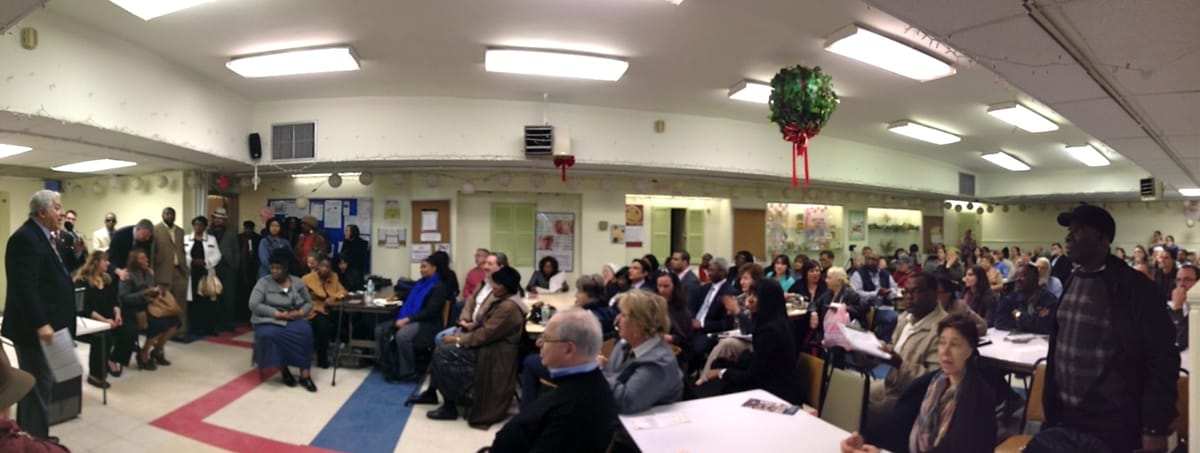
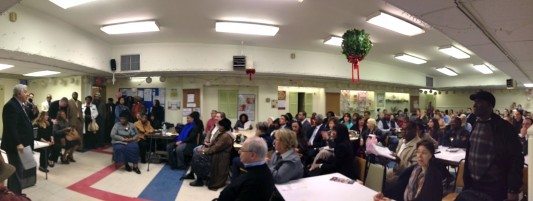
A ton of neighbors, and just about every local politician, turned out for last night’s Democratic mayoral candidates forum at Temple Isaac, presented by 44th Assembly District Leader Jacob Gold and the New Independent Democrats. The room was packed, definitely at or above the capacity limit of the space, and the 100-plus people in the audience had some feisty questions for the five candidates.
While the introductions (and some answers) from each candidate were pretty standard stump speeches, the audience did try to get some specific details out of them — and at times, like when discussing bike lanes, some in the crowd didn’t much like those answers. So let’s take a look at what they each had to say.
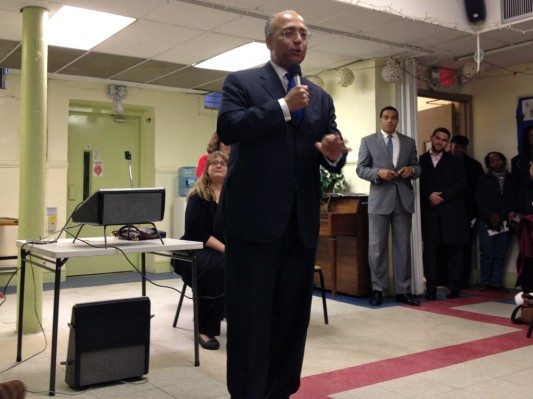
Though the event began at 5pm, none of the candidates had yet arrived. Jacob Gold, in a performance worthy of a Catskills comedian, tried to keep the growing crowd informed as we awaited the arrival of the first candidate, and he invited all the local politicians in the room up to speak one by one. Of note in those brief, unscheduled speeches were Saundra Thomas, who introduced herself in the somewhat unspecific way that she did with us last week, and City Councilwoman Letitia James, who is running for Public Advocate, and who managed to continually come up in candidates’ talks throughout the night. When Thompson finally arrived and began speaking, it was about 5:40pm.
Like most of the candidates to speak after him, Thompson said his top concerns are education reform (“It needs to be about comprehension, not memorization,” he said of standardized testing), public safety (he wants more police on the force, and thinks stop-and-frisk should continue but needs to be “used correctly”), and being a mayor who represents all of New York City (“We are a city of five boroughs,” he said, criticizing Bloomberg’s focus on Manhattan).
Question from the audience: How would you fix the Department of Education?
Thompson said he wants to change the evaluation system so that it’s not just about testing, but includes how college-ready students are. He wants to bring back art, music, and physical education programs, and focus on things other than standardized testing, like smaller class sizes and early childhood literacy. He wants to re-empower superintendents and revisit PEP. “School closings,” he added, “should not be a part of our education policy, but should be a last resort.”
Question from the audience: What would you do to create jobs?
He said he loves Bloomberg’s idea of making NYC a center for tech businesses, but doesn’t like the fact that our graduating students aren’t prepared well enough to get those jobs. He also mentioned wanting to keep big contract jobs with businesses that are located inside the city, and “better yet, they should be done with minority and women-owned businesses.”
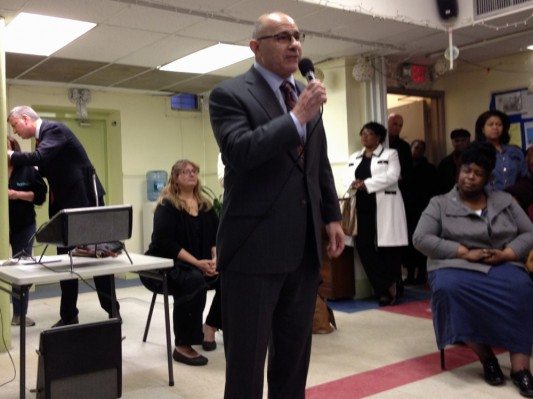
Arguably the underdog in this packed race, Albanese introduced himself as a former New York City public school teacher who wants to improve schools. “IQ is not the problem,” he said about our low-performing students. “Poverty is the problem.” To fix that, he wants to push not just early childhood education, but create incentives for businesses that employ the unemployed. He’d also like to develop training programs to help fill those jobs, working with the CUNY system to do so. Like Thompson and those who spoke after him, Albanese wants to make sure the mayor’s office pays attention to the city as a whole: “I want to be a different kind of mayor, and give regular people a voice in City Hall.”
Question from the audience: Can the mayor help fix early intervention therapy programs that are being eviscerated by the state?
“I will advocate that the state gives the city what it needs,” he said. “Those early years are pivotal.”
Question from the audience: What have you done, and where is your campaign money coming from?
Albanese explained that he wants “to be objective,” and doesn’t want to end up as a mayor who is indebted to lobbyists, so he said he is raising money “from New Yorkers who want good government.” As for his resume, he noted that in addition to his time as a teacher, he also was a City Councilman, and worked in law and finance for years. “You’re the only [candidate] who works for a living,” joked Jacob Gold.
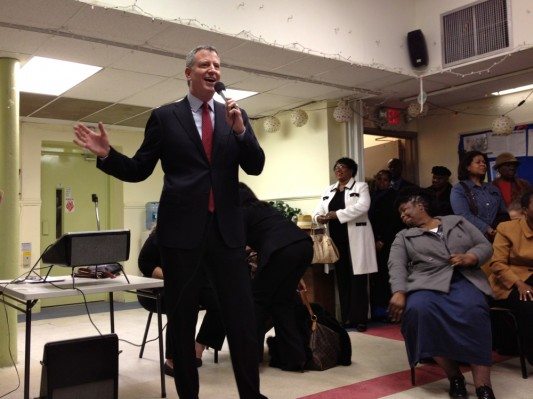
After the requisite jokes from Gold about de Blasio’s height (he noted he’s 6’5″), we got to hear a little about what de Blasio wants to see done differently in NYC. “We’re living a tale of two cities,” he said, adding that while we believe it’s a city for everyone, more and more it’s becoming too expensive to live in, inaccessible to all, not safe in some areas, and that schools don’t all have the same resources. “These are differences that are not sustainable.” Saying that we need “bold solutions,” he suggested a living wage be introduced, and that paid sick days should be available to everyone. Like the other candidates (perhaps because this was an event in Brooklyn), he said the same attention should be paid to the outer boroughs that is paid to Manhattan. He noted that he would be the first mayor in office to have a child attending a NYC public school, and that he wants to tax people making more that $500k to help fund full-day universal pre-K and three hours of guaranteed after-school programming for all middle schoolers. He noted he’s for adding an Inspector General of the NYPC.
Question from the audience: What would you do about charter schools?
“There are some that do good work,” he said, “but the ones that are failing our kids, they won’t be favored by me anymore.” He added that he’s not a fan of co-locating multiple schools, including charters, in the same buildings, and that he has also opposed closures across the city.
Question from the audience: What would you do about hunger?
He said that in all the forums like this one that he’s been to so far, that’s the first time he’s gotten that question. He said it’s not just about hunger, but about income disparity, and said that he wants to get rid of any “vestiges of the stigmatism” that can be present in obtaining food stamps. When he brought up that he wants to make sure fingerprints are no longer required to get food stamps, some audience members said that’s already happened, while other argued that they’d heard from people who have still been asked to give fingerprints.
Question from the audience: How would you fix real estate taxes, which are through the roof for small businesses?
“We need transparency and consistency in the tax code,” de Blasio said. He added that water bills are also ridiculous, as are small business fines, which he noted happen more in the outer boroughs.
Question from the audience: What would you do about universal curriculum for regents diplomas, which leaves a lot of students behind?
“The system is set up on two faulty notions,” he said. “Not enough focus on early childhood learning, and too much on testing.” He wants to invest in things that help change both of those.
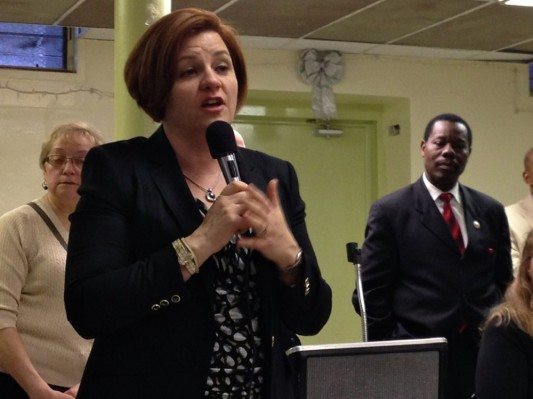
“For your mayor, you need someone with experience in getting things done,” said the City Council Speaker, who began by touting all that the Council has accomplished under her watch, like how “not one firehouse has closed,” how they worked out a deal to save a number of teachers’ jobs, how there has been a lot of pro-tenant regulations, niche manufacturing jobs, and how they’ve added more affordable housing — and how she plans to add more for middle-income earners. Transit needs some improvement, and to that end, she wants to see more ferry, select bus, and Metro North service added.
Question from the audience: What would you do about services for the elderly?
Seeing as we were in a senior center, which doesn’t appear to have any of the exercise equipment or other fancy items Quinn said have been getting around to senior centers, it was a pretty good question. Quinn noted how they need to listen to what seniors want and need, make a plan, and move forward with it. She said that’s what they’d done with countdown clocks. She added that she’d like to make a plan to help move seniors from large apartments where they’re living by themselves, or with a smaller family, to smaller apartments.
Question from the audience: Neighbor Nathan Thompson asked what she would do about subways south of Prospect Park, which seem to get no love from the MTA.
“I want the city to have more power,” she said in regards to New York City Transit. She proposes that the head of transit should be appointed by the mayor. Also, she said she understands that the way people commute in NYC has changed dramatically since the inception of the transit system: “We need a system that reflects how more people live and work in the same borough.”
Question from the audience: Ron Russo, who lives in one of the six Victorian Flatbush neighborhoods that are pushing for historic designation, asked what she would do to help historic preservation in the city.
Quinn said that people in the outer boroughs had been asking for more and more landmarking, and that they felt they weren’t being heard, so they pushed for that at LPC. She added that the process takes way too long, and should provide not just more timely responses, but better ones. Also, she wants to make sure that the City Council has the power to increase the size of a proposed historic district when it comes in to them, if that larger area had been a part of the study; at the moment, they can only decrease the size.
Question from the audience: How do you see the role of Community Boards?
“Having them as part of the land use process is central to it,” she said, noting that it helps make a direct link to community members.
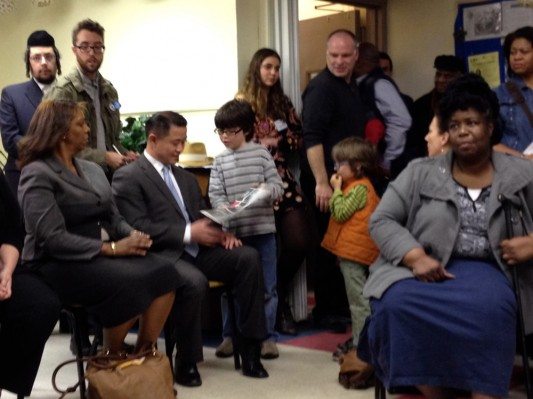
I do have a better photo from when he was speaking, but this seems like a good chance to talk about this awesome kid, who had some paper with all the candidates’ photos, and who got each one’s autograph. It was adorable. After signing, Liu spoke mostly about what he knows best — money, and how the city is good (or bad) at spending it. He said he thinks the city should borrow money for projects now, because interest rates are so low, to save money in the long-run. He said that the wealth gap is the biggest problem in our city, and that he has proposed income tax reform to make changes to the city income tax rate, lowering it for lower income earners, while raising it about 1% on those who earn more than $500k per year. He wants to give bigger tax breaks to small businesses. “We need to get the city out of the hands of billionaires,” Liu said, “and back into the hands of the people.”
Question from the audience: What are your thoughts on campaign finance laws?
This zinger came on the eve of the beginning of a trial involving two former Liu aides who are accused of campaign fundraising fraud, and caused some murmurs throughout the audience. Liu took it in stride, thanking him for asking, and stressed that, “I follow all the rules.” He said he doesn’t want to accept contributions from anyone that could cause conflict in his running of the city. And as for the investigations, he that if they have anything, they should “put up or shut up.” He said the investigations have been going on for years. “But the problem with this witch hunt,” he added, “is that there’s no witch.”
Question from the audience: Unlike Bloomberg, you have no business management experience. How would you manage the city of New York?
Liu noted that he’s the only candidate who hasn’t spent a large part of his career in politics, and that he has private sector experience. He said that as Comptroller, he has led a relatively large staff, adding, “it’s not just about experience, but also about vision.” He went on to explain this vision, which includes (like that of the others) decreasing the emphasis on testing in schools–replacing that with, actually, more tests. “Like weekly pop quizzes,” he explained, “that don’t go to the state, but which help teachers determine if the kids are learning the material.”
Question from the audience: A student named Sarah from Stuyvesant asked about his opinion of stop-and-frisk.
He said he wants to end stop-and-frisk and find better ways of keeping crime out of our neighborhoods, suggesting that the NYPD looks at “focused deterrence,” which he thinks would help bridge the animosity that stop-and-frisk has created between communities and the police.
Question from the audience: A frustrated driver asked what he would do about the increase of bike lanes in the city.
This did not go over well with a clearly divided crowd, who began arguing with each other right away. Liu managed to get an answer in, siding with drivers. He said that they make sense in Manhattan, but in Brooklyn and Queens, he said he’s stood watching for a long time without seeing any cyclists ride past. He also said that there is “little to no community input” when the Department of Transportation looks at installing bike lanes (though, we’ve so far seen that the DOT is trying, in our area, to reach out via the Community Board).
Question from the audience: Do you think we should have an Inspector General?
He said he’s not sure it would be effective, and thinks the bigger problem is racial profiling from stop-and-frisk, which should be addressed before they look at having an Inspector General.
Question from the audience: Which of the mayor’s initiatives have worked or not worked?
He’s pro PlaNYC, and that he likes the idea of the high tech campus on Roosevelt Island. But he thinks that money has been wasted in a lot of places, and can be better allocated in the future.
Question from the audience: A very neighborhood-specific question came up about rental cars with out-of-state licenses being parked on our streets, and what he could do about that.
After saying that, of course, he didn’t know the specifics of the situation but would look into it, he said that City Hall needs to be more accessible, providing better access to local neighborhoods. He said basically the same thing in response to the final question of the night that followed this one, but by that point, it was about 7:40pm, the crowd was pretty much done and getting up and leaving, and so the night wound down about as informally as it started.
Did anyone who went come away with any impressions, positive, negative, or different than you had before, about the candidates? And would you like to see more forums like this in the neighborhood in the future?



